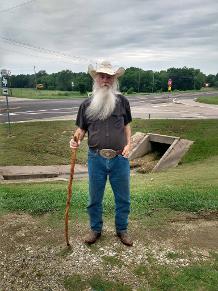GOD'S WORD
▬ The Anointed Workers ▬
January 14, 2024

Reverend Danny Rhoades
Good day Brothers and Sisters. Before I start on my Daily Devotional, I want to read the following KJV Bible Verses to you:
1 Samuel 16:13 - Then Samuel took the horn of oil, and anointed him in the midst of his brethren: and the Spirit of the LORD came upon David from that day forward. So Samuel rose up, and went to Ramah.
2 Corinthians 1:21-22 - Now he which stablisheth us with you in Christ, and hath anointed us, is God; Who hath also sealed us, and given the earnest of the Spirit in our hearts.
1 John 2:27 - "But the anointing which ye have received of him abideth in you, and ye need not that any man teach you: but as the same anointing teacheth you of all things, and is truth, and is no lie, and even as it hath taught you, ye shall abide in him."
According to these verses, the anointing of workers today is not based on any specific rituals or ceremonies, but on the presence and power of the Holy Spirit in their lives.
In today’s devotional, we will explore about the anointed workers, throughout history, that held a special place in the realm of spirituality and religion. Their designation as anointed is often associated with a higher calling, divine favor, or a specific mission. In this devotional, we'll delve into the fascinating world of anointed workers, investigating whether there are any specific rituals or ceremonies that accompany their recognition in contemporary society. By examining the historical roots of anointment practices and exploring their significance in the modern context, we seek to shed light on the role of anointed workers and the rituals that surround them. Through this aim to gain a deeper understanding of the rituals and ceremonies that contribute to the anointing process and its impact on both individuals and communities today.
Anointed workers, in various religious and spiritual contexts, are individuals who have been recognized or appointed for a specific role or purpose. The act of anointment symbolizes a spiritual connection and often signifies divine favor or authority. These individuals are often seen as intermediaries between the divine and human realms, entrusted with specific responsibilities.
Anointment holds deep symbolic significance across cultures and religions. It signifies a consecration or blessing, marking a person's readiness or qualification for a particular task. Whether it involves anointing with oil, water, or other substances, the act itself is believed to bestow divine grace, protection, or empowerment. The anointment process can vary, but it is commonly regarded as a sacred and transformative experience.
Anointment rituals have been practiced since ancient times, with evidence found in civilizations such as ancient Egypt, Mesopotamia, and Greece. These cultures believed in the power of anointing oils and their ability to connect individuals with the divine. In ancient Egypt, for example, the pharaohs and priests underwent anointment ceremonies, symbolizing their divine authority and spiritual purity.
Across different civilizations, anointment ceremonies took on various forms. In Judaism, anointing with oil was performed to consecrate kings, prophets, and priests. The anointed ones in Christianity, such as Jesus Christ, were believed to have been anointed by God for their divine missions. Similarly, in ancient Greece, athletes were anointed with oils before competitions to invoke the gods' favor and protection.
In modern society, the concept of anointed workers has evolved within religious and spiritual communities. While the specific rituals and ceremonies may vary, anointed workers are still recognized for their distinctive roles and divine calling. These individuals may include pastors, priests, spiritual leaders, or healers who have undergone a process of anointment or ordination to serve their communities.
Anointed workers play pivotal roles in religious and spiritual communities. They often serve as guides, teachers, and facilitators of sacred rituals or ceremonies. These individuals are seen as conduits for divine wisdom, offering support, guidance, and comfort to their followers. The anointment process signifies their commitment to their role and the recognition of their spiritual gifts.
In investigating the rituals and ceremonies associated with becoming recognized as an anointed worker today, a combination of qualitative research methods was employed. This included conducting interviews with religious and spiritual leaders, analyzing relevant literature and religious texts, and exploring cultural practices related to anointment.
To gain insights into anointment rituals and ceremonies, various sources were consulted. These included religious texts such as the Bible, Quran, and other sacred scriptures, historical accounts of ancient civilizations, scholarly articles, and personal accounts from individuals who have undergone an anointment process. By drawing from a diverse range of sources, a comprehensive understanding of anointment practices was obtained.
During our investigation, we delved into various religious traditions to uncover the specific rituals or ceremonies associated with anointed workers. We discovered that many faiths have their own unique practices when it comes to anointment. For example, in Christianity, the sacrament of Anointing of the Sick is performed with holy oil, symbolizing healing and spiritual strength. In Judaism, the anointing of a king with sacred oil represents the divine selection and responsibility of leadership. These rituals are steeped in tradition and hold great significance within their respective religious contexts.
Additionally, we explored ceremonies within spiritual communities that recognize and celebrate anointed workers. These ceremonies often involve the congregation gathering to offer blessings and prayers to the individual being anointed. Some communities may incorporate symbolic gestures, such as the laying on of hands or the use of essential oils, to affirm and reaffirm the chosen status of the anointed worker. These ceremonies serve as acts of unity and support, reinforcing the community's belief in the individual's spiritual calling.
Anointment rituals hold great transformative power, both for the individual being anointed and the community as a whole. These rituals serve as tangible symbols of divine calling and consecration, providing individuals with a sense of purpose and validation. The act of anointing can be deeply personal and empowering, allowing individuals to fully embrace their spiritual journey and step into their roles as anointed workers. The transformative nature of these rituals goes beyond religious and spiritual contexts, as they can also inspire personal growth and self-discovery.
Anointed workers play a significant role in fostering community cohesion and spiritual growth. By being recognized and anointed, these individuals often become leaders, guides, and sources of inspiration within their communities. Their presence and involvement can bring a sense of unity and purpose, as they lead and support others on their spiritual paths. Anointed workers become catalysts for spiritual growth, providing guidance, solace, and a sense of connection to something greater than oneself.
Like any spiritual practice, anointment rituals are not immune to skepticism and criticism. Some may question the validity of these rituals, viewing them as mere cultural or religious constructs without any inherent power or meaning. Skeptics often question the ability of anointed workers to possess any special abilities or insights. However, it is important to note that the value and significance of these rituals are subjective and vary from person to person.
Another point of controversy revolves around the authenticity of anointed workers themselves. Debates arise over the legitimacy of an individual's claim to be anointed. This can lead to disputes within communities and challenges to established hierarchies. It is crucial to approach these controversies with open minds and a willingness to engage in respectful dialogue, allowing for multiple perspectives to be heard and understood.
While anointment rituals may have ancient roots, their relevance and significance persist in the modern world. These rituals continue to provide individuals with a sense of purpose, validation, and connection to their spirituality. They serve as reminders of our capacity for growth, transformation, and the pursuit of higher ideals. The enduring legacy of anointment practices is a testament to the enduring human need for rituals that mark significant transitions and milestones.
As our world continues to evolve and change, the role of anointed workers may adapt to new contexts and demands. These individuals have the potential to offer guidance and support during times of uncertainty and transition. The future of anointed workers lies in their ability to adapt and connect with people in a way that resonates with the challenges and aspirations of contemporary society. By embracing their calling with humility, wisdom, and compassion, anointed workers can continue to make a meaningful impact in the lives of others.
Brothers and Sister, now let us review what I just talked about.
First, what are anointed workers?
Anointed workers are individuals who are recognized or designated as having a special calling, divine favor, or a specific mission within the realm of spirituality and religion. They often possess unique spiritual gifts and talents that set them apart and make them instrumental in guiding and serving their communities.
Second, are there specific rituals or ceremonies associated with becoming an anointed worker?
Yes, throughout history, anointment rituals and ceremonies have been practiced recognizing and designate individuals as anointed workers. These rituals can vary across different traditions and cultures but often involve elements such as anointing with sacred oils, prayers, blessings, consecrations, and symbolic gestures.
Third, how do anointed workers contribute to modern society?
Anointed workers play diverse roles in modern society. They serve as spiritual leaders, healers, guides, or conduits connecting individuals and communities with the divine. Through their teachings, counseling, and presence, they provide guidance, inspire transformation, foster spiritual growth, and promote community cohesion.
Fourth, are anointed workers universally accepted and respected?
The acceptance and respect for anointed workers vary across different societies and belief systems. While some communities highly regard anointed workers and their rituals, others may view them with skepticism or controversy. Debates surrounding the authenticity and role of anointed workers continue to exist, reflecting the diversity of perspectives and beliefs present in our world today.
Brothers and Sisters conclusion, the world of anointed workers and the associated rituals and ceremonies has unveiled a rich tapestry of history, belief, and spirituality. While the specific rituals may vary across different traditions and cultures, the concept of anointed workers continues to be relevant in contemporary society. These rituals hold significance not only for the individuals who undergo them but also for the communities they serve. The enduring legacy of anointment practices reminds us of the transformative power they hold, bridging the gap between the divine and the human. As we reflect on the relevance of anointment rituals today, we acknowledge the profound impact anointed workers can have in and the pursuit of higher purposes.


You are a child of the universe, no less than the trees and the stars; you have a right to be here.
Join us in spreading God's love and compassion to those in need.



